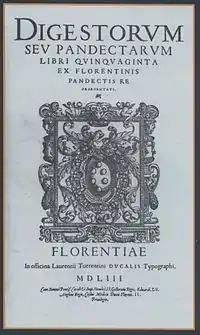pandect
English
Etymology


Sense 3 (“comprehensive treatise”) is from Latin pandectēs (“book that contains everything, encyclopedia”), from Ancient Greek πανδέκτης (pandéktēs, “encyclopedia”, literally “all-receiver”), from παν- (pan-, prefix meaning ‘all’) (from πᾶς (pâs, “all”)) + δέκτης (déktēs, “receiver, recipient”) (from δέχομαι (dékhomai, “to receive”) (from Proto-Indo-European *deḱ- (“to take; to perceive”)) + -της (-tēs, suffix forming agent nouns)).[1][2]
Sense 1 (“compendium of writings on Roman law”) in the plural form Pandects is from Late Latin pandectae (“the Pandects”), the plural of pandectēs, modelled after (Byzantine) Ancient Greek πανδέκται (pandéktai, “the Pandects”), the plural of πανδέκτης (pandéktēs): see further above.[1]
Pronunciation
- (Received Pronunciation) IPA(key): /ˈpændɛkt/
Audio (UK) (file)
- (General American) IPA(key): /ˈpænˌdɛkt/
- Hyphenation: pan‧dect
Noun
pandect (plural pandects)
- (Ancient Rome, law, historical) Usually in the plural form Pandects: a compendium or digest of writings on Roman law divided in 50 books, compiled in the 6th century C.E. by order of the Eastern Roman emperor Justinian I (c. 482–565).
- 1734, John Ayliffe, “[Dedication]”, in A New Pandect of Roman Civil Law, […], London: Printed for Tho[mas] Osborne, […], OCLC 863527391:
- After upwards of Thirty Years Study, and a painful Induſtry, in compiling A New Pandect or Complete Body of the Roman Civil Law; the Firſt Volume of this Undertaking craves Leave to appear in the World under the Patronage and Protection of your Lordſhip, [...]
- 1750 January, “We See in a Monthly Book Published at Paris, with the Royal License, an Advertisement with a New Print of a Remarkable and Famous Hermaphrodite, [...]”, in Sylvanus Urban [pseudonym; Edward Cave], editor, The Gentleman’s Magazine, and Historical Chronicle, volume XX, London: Printed by Edw[ard] Cave, […], published January 1755, OCLC 192374019, page 20, column 2:
- And altho' there are many relations of perfect hermaphrodites, creatures that poſſeſſed the power of both ſexes, and could both beget and conceive children, yet theſe relations are treated as fabulous, notwithſtanding ſome laws concerning them are found both in the Roman and Gallic pandect.
- 1788, Edward Gibbon, chapter XLIV, in The History of the Decline and Fall of the Roman Empire, volume IV, London: […] W[illiam] Strahan; and T[homas] Cadell, […], OCLC 995235880, page 361:
- But the juriſprudence of the Pandects is circumſcribed within a period of an hundred years, from the perpetual edict to the death of Severus Alexander [...]
- 1824 June, [Walter Scott], “Letter II. Alan Fairford to Darsie Latimer.”, in Redgauntlet, […], volume I, Edinburgh: […] [James Ballantyne and Co.] for Archibald Constable and Co.; London: Hurst, Robinson, and Co., OCLC 926803915, page 27:
- And now, upon this third morning after your departure, things are but little better; for though the lamp burns in my den, and Voet on the Pandects hath his wisdom spread open before me, yet as I only use him as a reading-desk on which to scribble this sheet of nonsense to Darsie Latimer, it is probable the vicinity will be of little furtherance to my studies.
-
- (by extension, rare) Also in the plural form pandects: a comprehensive collection of laws; specifically, the whole body of law of a country; a legal code.
- Synonym: digest
- 1611, [Miles Smith], “The Translators to the Reader”, in The Holy Bible, […] (King James Version), London: […] Robert Barker, […], OCLC 964384981:
- In a word, it [Scripture] is a Panary of holeſome foode, againſt fenowed traditions; a Phyſions-ſhop (Saint Baſill calleth it) of preſeruatiues against poiſoned hereſies; a Pandect of profitable lawes, againſt rebellious ſpirits; a treaſurie of moſt coſtly iewels, againſt beggarly rudiments; Finally, a fountaine of moſt pure water ſpringing vp vnto euerlaſting life.
- 1682, Thomas Flatman, “The Review. Pindaric Ode to Dr. W. S.”, in Poems and Songs, 3rd edition, London: Printed for Benjamin Tooke, […], OCLC 79627010, stanza IX, page 21:
- Give me the Pandects of the Law Divine, / Such was the Law made Moſes face to ſhine.
- (by extension, also figuratively) A treatise or similar work that is comprehensive as to a particular topic; specifically (Christianity) a manuscript of the entire Bible.
- 1750 November, “Art. XV. The Œconomy of Human Life, Translated from an Indian Manuscript, Written by an Ancient Bramin; to which is Prefixed an Account of the Manner in which the Said Manuscript was Discovered. […] [book review]”, in The Monthly Review; or, New Literary Journal. […], volume IV, London: Printed for R[alph] Griffiths, […], OCLC 901376714, page 64:
- The table of contents which we inſert here will give a juſt idea of the method with which this ſmall pandect of morality is compoſed.
- 2003, Carmella Vircillo Franklin, “Bilingual Philology in Bede’s Exegesis”, in Richard F. Gyug, editor, Medieval Cultures in Contact (Fordham Series in Medieval Studies; 1), New York, N.Y.: Fordham University Press, →ISBN, ISSN 1542-6378, page 3:
- During a visit to Rome in 679–80, the Anglo-Saxon monk Ceolfrith from Northumbria acquired a magnificent pandect, an entire Bible bound as one volume, and brought it back to England with him, to his monastery of Wearmouth-Jarrow. We now know that the book that Ceolfrith bought in Rome was the so-called Codex Grandior, a pandect written under the supervision of Cassiodorus, the scholar-monk founder of Vivarium, in Calabria in the sixth century.
- 2006, Francis Cairns, “The Nomenclature of the Tiber in Virgil’s Aeneid”, in Joan Booth and Robert Maltby, editors, What’s in a Name?: The Significance of Proper Names in Classical Latin Literature, Swansea: The Classical Press of Wales, →ISBN, page 68:
- At 8.330–2, which will be treated again below, Virgil seems to be offering some guidance about part of this tangle of 'problems' (although he was at the same time a pandect when it came to the Tiber and its nomenclature).
- 2006, Mary Dove, “The Middle Ages”, in John F. A. Sawyer, editor, The Blackwell Companion to the Bible and Culture (Blackwell Companions to Religion), Oxford: Blackwell Publishing, →ISBN; republished Oxford: Wiley-Blackwell, 2012, →ISBN, page 39:
- Pandects, manuscript-volumes containing all the books of the Old and New Testaments, were enormous and very rare.
-
Coordinate terms
- (comprehensive collection of laws): compendium
Derived terms
- pandectist
Translations
|
|
|
Notes
- From the collection of the Russian Museum in Saint Petersburg, Russia.
References
- “pandect, n.1”, in OED Online
 , Oxford, Oxfordshire: Oxford University Press, March 2005.
, Oxford, Oxfordshire: Oxford University Press, March 2005. - “pandect, n.”, in Lexico, Dictionary.com; Oxford University Press, 2019–2022.
Further reading
 Digest (Roman law) on Wikipedia.Wikipedia
Digest (Roman law) on Wikipedia.Wikipedia